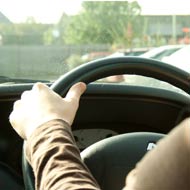Young drivers 'most likely to take work calls'

Drivers who talk on the phone are four times more likely to have a crash resulting in injury.
Nearly half of young drivers have taken a work-related call whilst behind the wheel, according to a recent survey. Road safety charity Brake says employers have a responsibility to ensure they are not putting their staff in danger.
Brake's survey of 1,000 drivers shows that 49 per cent of young people (aged 17-24) had taken a work call while driving, compared to 17 per cent of drivers across all age groups.
These figures include calls taken on both hand-held and hands-free phones, as previous studies suggest they are equally dangerous. Drivers who talk on the phone are thought to be four times more likely to have a crash resulting in injury.
According to the survey, young drivers are not only the most likely to engage in work calls on the road, but are also more likely to take calls from friends and family. More than a third said they had talked to family on the phone while driving and just over a fifth had talked to friends.
Brake is calling for a ban on using hands-free at the wheel and is urging people to keep their phones on silent and out of reach while driving. It is currently illegal to use a hand-held phone while driving.
The charity is also urging people not to engage in phone calls with employees, colleagues, friends or family members when they know they are behind the wheel.
"In the modern world, drivers are confronted with many distractions that prevent them from giving the road their full attention, risking devastating crashes and loss of life," said Julie Townsend, the charity's deputy chief executive.
"It is a sobering thought that a significant number of these life-threatening distractions come from drivers' own friends and family. That's why we're urging people to put their loved ones safety first by refusing to speak to them on the phone while they are driving.
"Employers, too, have an important responsibility to make sure they are not putting their employees in danger."
To see the full survey findings, visit: http://www.brake.org.uk/news/1479-who-s-putting-your-life-on-the-line-for-a-quarter-of-drivers-it-s-family



 HMRC has invited feedback to its communications regarding the employment status of locum vets and vet nurses.
HMRC has invited feedback to its communications regarding the employment status of locum vets and vet nurses.